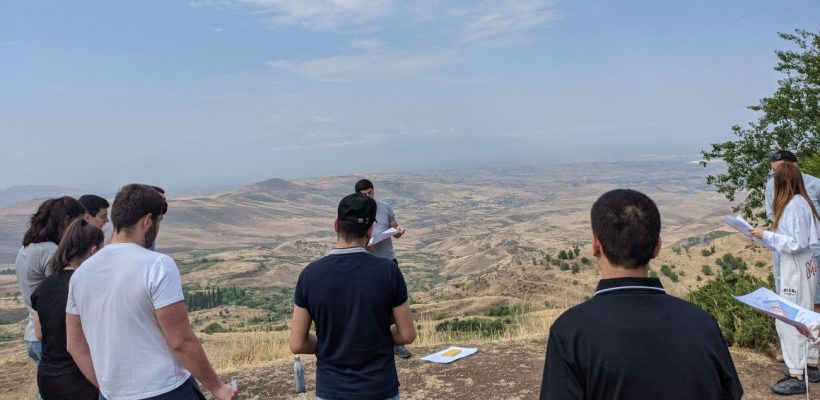
AUA Students Study Landslides in Voghjaberd Village
2 min readVOGHJABERD, Armenia — On July 14, 2021, students of the American University of Armenia (AUA) visited the village of Voghjaberd in Kotayk Province to better understand landslide hazards in Armenia. Students learned about the causes of landslides in that part of the country while getting an understanding of the monitoring and mitigation strategies implemented there. The trip was sponsored by the AUA Acopian Center for the Environment and was led by course instructor Sean Reynolds and Dr. Hayk Igityan of the National Academy of Sciences Institute of Geological Studies.
During the field trip, students visited a monitoring station, which measures the movement of a landslide that affects the main road between Yerevan, Garni, and other villages in the area. Dr. Igityan duly explained the connection between responsible irrigation and landslide risk in the village, also covering the broader mitigation efforts expended in Armenia. Students also took part in a practical exercise using smartphone GPS and cameras to monitor cracks and changes to structures situated in the landslide area. Finally, course instructors demonstrated modern monitoring solutions, including drone-produced 3D models of the area, which are used to understand how the landslide evolves over time.
The field trip was a part of the undergraduate environmental course titled ‘Disasters’ in which students study the disaster management cycle and how it relates to broader environmental issues facing Armenia and the world. In this case, a key takeaway for students was how climate change will increase the risks posed by landslides in Armenia in the coming decades. The lesson underscores the connections between the environment and hazards humans face in a changing world and the need for leadership in efforts to combat the effects of climate change.
The AUA Acopian Center for the Environment, a research center of the American University of Armenia, promotes the protection and restoration of the natural environment through research, education, and community outreach. The AUA Acopian Center’s focus areas include sustainable natural resource management, biodiversity, and conservation, greening the built environment, clean energy, and energy efficiency, as well as information technology and the environment.
